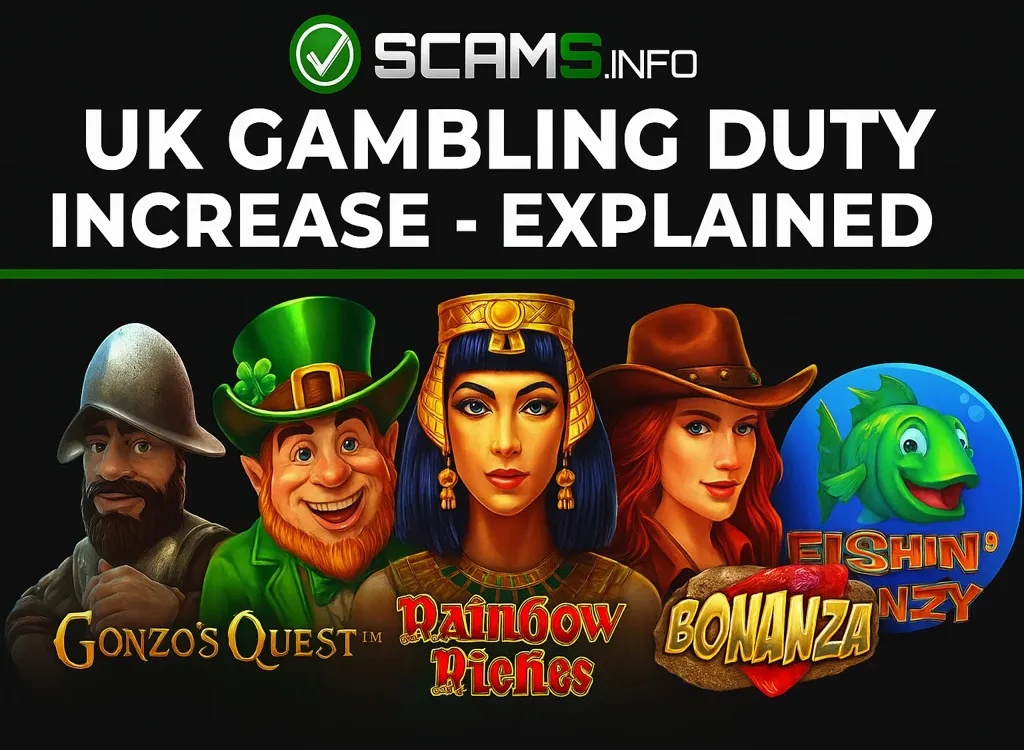UK Gambling Duty Explained: How a 50% Tax Rise Could Reshape Online Slots
In the UK, a steep tax hike on gambling is being debated, with duties potentially rising from 21% to 50%. The whole industry is in the frame, from sports betting to online casinos, but slots have become the headline target because they generate the most revenue and attract the most scrutiny.

It’s important to stress that this is a Gambling Duty paid by operators, not a direct tax on players. However, higher costs for casinos and betting companies often filter down the line, which means the player experience could still change.
At stake is not just government revenue, but also how slot sessions feel for ordinary players. Fewer promotions, lower returns, and shorter playtime could become the norm. These changes matter because they shape the fun and value you get from every spin. A deposit that once lasted an evening may run out more quickly and bonuses that added excitement could shrink. For players who see slots as entertainment, not just numbers, the proposed tax hikes raise a simple question: will the experience still be worth it?
The Push For Higher Taxes
Proposals from figures such as Gordon Brown suggest slot duty could rise as high as 50%. Advocates argue that since online slots generate huge profits, operators should contribute more. Yet every percentage point added filters down into the player experience, changing how games are delivered.
Why Slots Are In The Crosshairs
Slots are the UK’s most popular form of gambling. According to the UK Gambling Commission, they generate more revenue than betting, poker, or bingo. Policymakers see them as lucrative but risky, with rapid play cycles encouraging long sessions—making them a prime target for heavier taxation.
The Operator Response
Major operators warn that higher taxes could shrink the regulated market. If profit margins fall too far, companies may scale back, leaving players with fewer safe options. Worse, some gamblers could drift toward offshore platforms that ignore UK rules on fairness or player protection (FT report).
Impact On Gameplay
When operator costs rise, players usually feel it in the games themselves. That could mean:
- Lower RTP: Games adjusted downward from 96% toward 94% reduce long-term returns.
- Fewer bonuses: Free spins, cashback, and welcome deals may shrink or vanish.
- Reduced innovation: Studios may play it safe, leading to repetitive releases.
- Shorter sessions: Bankrolls may not last as long, reducing entertainment value.
If you want to compare what’s currently available, explore our slot casinos comparison page to see which platforms provide the best mix of games, RTPs, and bonuses before changes take effect.
Player Upsides?
Some policymakers argue that tighter conditions could reduce harm. Fewer promotions and shorter play sessions might mean players deposit less. But many casual fans will feel they are being punished alongside high-risk groups, getting less fun for the same spend.
Offshore Site Risks
If the licensed market becomes less appealing, offshore casinos will try to tempt players with higher payouts and generous offers. Without regulation, however, they bring serious dangers:
- Games may not be tested for fairness
- Responsible gambling tools are often missing
- Payouts can be unreliable, with little legal recourse
These risks make offshore casinos look attractive at first glance, but the dangers far outweigh the short-term perks.
Lessons From Abroad
Other European markets show the risks of over-regulation. In Sweden, strict restrictions drove many players to unlicensed sites. High gambling taxes elsewhere have reduced player choice. The UK’s balance of regulation and freedom is fragile – push too far, and players could drift into unsafe territory.
What Players Can Do
Players can’t change tax policy, but they can protect themselves. Practical steps include:
- Check RTPs: Always review return-to-player values before playing
- Stick to licensed casinos: Even with fewer bonuses, they are safer
- Set limits: Plan deposits knowing sessions may be shorter
- Speak up: Respond to consultations or forums so the player perspective is heard
These actions won’t change government policy, but they help players stay safe and ensure their voices aren’t lost in the debate.
The Human Angle
Players are rarely at the centre of policy debates. Politicians talk revenue, operators talk profits, but slot fans just want safe, enjoyable games. For many, slots are entertainment and artistry. For others, fewer bonuses might reduce harm. The challenge is protecting vulnerable players without diminishing fun for everyone else.
Conclusion: Spinning Toward Uncertainty
The UK slot landscape may soon change dramatically. A tax hike from 21% to 50% would ripple through every part of the industry. Players can expect lower RTPs, fewer bonuses, and less variety. Some may welcome shorter play, others will feel short-changed. Offshore sites will look more tempting, raising new risks such as the rising threat of scambling.
The government faces a delicate balancing act: raise funds and protect society without driving players to the black market. For slot fans, one thing is clear – change is coming, and the spins may never feel quite the same again.